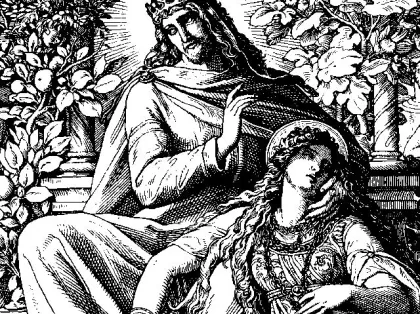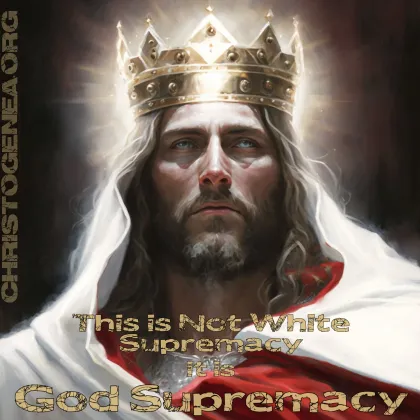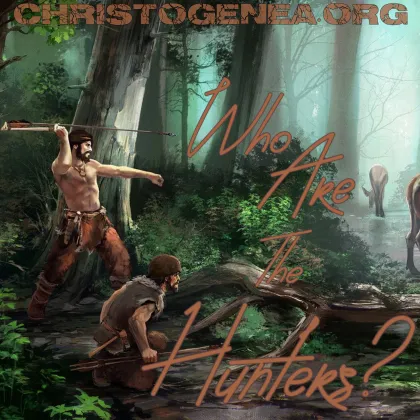Clifton Emahiser on his beginnings in Christian Identity

Clifton Emahiser on his beginnings in Christian Identity.
See Clifton's writings at http://emahiser.christogenea.org
Christogenea is 100% reader supported. If you find value in our work, please contribute and help to keep it going! See our Contact Page for more information!

Clifton Emahiser on his beginnings in Christian Identity.
See Clifton's writings at http://emahiser.christogenea.org

William Finck talks to Clifton Emahiser about Covenant Theology vs. Replacement Theology, and Clifton's experiences debating with members over his own family over his Christian Identity beliefs.
As probably all of our listeners know, Clifton Emahiser had suffered a bad fall in his home last August, so we moved him here to Florida to stay with us. Just before his accident, Clifton had sent me a few short essays to proofread, and finally, after ten months, I have been getting around to it. We posted two of those essays on his website this morning. The first, we presented in a discussion here a few weeks ago, which was Pitfalls Found in Biblical Research Materials, Part 1. I labelled that as “Part 1”, and not Clifton, hoping to encourage him to write a sequel, because it is a topic about which I am certain he has a lot more to say. Now we have Clifton here with us once again to discuss the second of those essays, which I also posted to his website this morning.
Sadly, this turned out to be Clifton's last podcast. We miss him dearly.
Genealogy, or Geography?
There has long been a tendency among the people of our race to draw their allegiances along geographical lines, often to the detriment of the more natural genetic allegiances. When we move into a land, and multiply and spread ourselves throughout it, we tend to adopt regional names for ourselves. Thus we have Norsemen and Franks, Englishmen and Germans, Yankees and Rednecks, and Buckeyes and Tarheels, and yet they all came from the same place. After years of separation, we then have situations where the aliens in a land, eventually accepted to one degree or another, and for one reason or another, are esteemed to be closer in relationship to us than our own cousins from other lands. And so a crowd of Americans – in spite of their own English descent – may be seen cheering on a negro against an English boxer in a game, simply because the negro is wearing an American insignia. That is just one modern example. More dreadfully, a tribe of Benjamintes would go to war against the surrounding related tribes to defend crimes perpetrated by men of dubious background, and for that the entire tribe was at one time reduced to merely a few hundred, nearly being decimated entirely.
That is how old this phenomenon truly is: as old as the Book of Judges in the Bible, and probably much older than that. In Judges Chapters 19 and 20, we see related an account where the entire tribe of Benjamin stood up to defend a town, Gibeah, which would not turn some murderers and rapists over to judgement. The criminals were called sons of Belial from the beginning of the account, and it is evident that they were not Benjaminites. The word Belial, as can be proven from an examination of the Hebrew language, refers to the state of being mixed. In 1 Samuel 10:26, much later, we see that these same children of Belial were still in this same town, and they were still causing problems for the Israelites!

This evening, rather than present my commentary on the balance of John chapter 3, something which I am not yet quite prepared to do, I decided to present a related paper by Clifton Emahiser, and offer an expanded commentary on that. The paper is titled John 3:16, What It Says And What It Doesn't, and was finalized by Clifton on March 8th, 2004. Doing this, I will necessarily repeat several things which I said in Part 9 of my commentary on the Gospel of John, and also some things which I hope to state in Part 10, which is soon forthcoming. Doing this, the evolution of our opinions on John 3:16 may also be better understood, although I wish that Clifton were here to share that. In this paper, Clifton employed several of my own notes which I had sent to him on the subject, but also, because he was copying something I wrote to him in a letter, he referred to several other of my writings, which I shall endeavor to include or elaborate upon here.
John 3:16, What It Says And What It Doesn't
Most of Clifton’s pamphlet-sized essays were written in response to someone that he had questions from, or someone whom he questioned, or sometimes something he saw in the media. I do not remember the specific reason why Clifton had written this essay, but because he included a couple of paragraphs from a letter I wrote to him on the subject, and because they discussed the errors of a certain individual whom Clifton addresses here, we must have had an ongoing dialog leading up to this publication. As the impetus for this essay, Clifton recalls a trip he made to Louden, Tennessee, for a Christian Identity gathering in 1996. During the course of his nearly 20-year ministry, Clifton had made quite a few responses to what he had seen and heard at that particular gathering, and this was perhaps the last of them. Among those responses, he was compelled to write his papers on the Ephraim-Scepter Heresy, a Defense of Matthew & Luke and more significantly, the first 21 of his Watchman’s Teaching Letters, which were all subtitled with the question Just Who is This Patriarch, Judah? So it might even be safe to say that the single gathering in Louden was also the real impetus for Clifton’s starting his ministry.

Spiritual Sperm?
Here I am going to present and comment on a paper which was first published by Clifton Emahiser in September, 2006.
In my opinion, one important aspect of our New Testament commentaries here at Christogenea is a constant endeavor to illustrate the differences of Biblical Christianity, as it is evident in both the writings of the Old Testament prophets and the New Testament apostles, with the interpretations of Scripture which were accepted and institutionalized after Christianity had emerged from persecution in the 4th century, as a Roman-government approved Church began to take form. To a great degree, these interpretations are still found throughout the Roman Catholic and Eastern Orthodox as well as all of the Protestant churches.
While I am only offering a hypothesis, it is very likely that these differences resulted because Christianity was persecuted by Jews for several centuries, and by the Romans often at the instigation of the Jews, at the same time that it was being infiltrated by Judaizers, which is evident throughout the New Testament epistles and Acts of the Apostles. During this period of persecution, the Judaizers sought to corrupt Christianity, and as Judaic thought gained more and more traction on a persecuted Christianity, there is an evident transition which occurred within the first century of the dissemination of the gospel. The spread of the gospel began as a message to the scattered twelve tribes of Israel and ended by adopting what we may call replacement theology, which is the misguided concept that somehow mere “gentiles”, people of other races and nations, had replaced the actual children of Israel as the object of the promises of God. This happened during a murky period of Christian history from about 100 AD up to the time of Justin Martyr, a period about which little is known. But the apostles, as well as the prophets, had taught that the twelve tribes of Israel which were scattered abroad, and had already become many nations, were being called to Christ. But the Judaic form of Christianity which took root in Palestine and in Alexandria and which ultimately became dominant had taught that anyone who was baptized and believed in Jesus somehow became one of the children of a “new” Israel, which was the ecclesia, and later, the Church.

The Gospel of the Kingdom
Tonight’s program is really a sort of sequel to our presentation last week, This is Not White Supremacy, It is God Supremacy, although it also stands by itself so that last week’s presentation is really not a prerequisite. Here we shall discuss The Gospel of the Kingdom, with a critique of Bertrand Comparet's sermon, What Gospel?
In Matthew chapters 4 and 9, the apostle described Yahshua Christ as “preaching the gospel of the kingdom”, and then, much later and at the end of His ministry, in Matthew chapter 24 Christ Himself is recorded as having said “14 And this gospel of the kingdom shall be preached in all the world for a witness unto all nations; and then shall the end come.” These words are quite ominous, as Christ Himself equates the fulfillment of the age with the preaching of the Gospel of the Kingdom. So the preaching of the Gospel of the Kingdom will usher in the fulfillment of the age and the return of Christ. However the Gospel of Christ has been preached in diverse manners for two thousand years, and the end has not yet come. So we must ask, was Christ wrong, or could it be that the gospel of the churches is not the Gospel of the Kingdom? Here we hope to answer that question.
In the gospel of Mark, in Mark chapter 1 we read “14 Now after that John was put in prison, Jesus came into Galilee, preaching the gospel of the kingdom of God, 15 And saying, The time is fulfilled, and the kingdom of God is at hand: repent ye, and believe the gospel.” But the time which was fulfilled was that of the coming and purpose of the Messiah, and not necessarily that of the end of the age. Christ Himself, as it is recorded in Luke chapter 4, had cited a portion of Isaiah chapter 61 in reference to Himself, where He said that He had come “2 To proclaim the acceptable year of the LORD…” But we know that it was not yet the end of the age because He stopped short of citing the rest of the passage, which continues and says “… and the day of vengeance of our God; to comfort all that mourn; 3 To appoint unto them that mourn in Zion, to give unto them beauty for ashes, the oil of joy for mourning, the garment of praise for the spirit of heaviness; that they might be called trees of righteousness, the planting of the LORD, that he might be glorified.” This we await with His promised return.

The Importance of the Song of Solomon to Biblical Anthropology
Tonight’s program is going to serve two purposes. Firstly, it is a defense of the Song of Solomon, which is also sometimes called Canticles or the Song of Songs, as a Biblical book which belongs in our Scripture. Secondly, it will serve as an exposition of a paper recently published by Clifton Emahiser, which was titled It is Biblical to be Caucasian, Song. Chapters 4 to 7. Clifton’s paper was published at his website in four installments from August 2014 through February 2015.
The word anthropology is defined in Collins’ English Dictionary as “the study of humans, their origins, physical characteristics, institutions, religious beliefs, social relationships, etc.” Here we shall concern ourselves with only one aspect of the term: the physical characteristics of certain people in the Bible. Once we determine these characteristics, there is little doubt we may determine the general race of the ancient Israelites of Scripture.

This is Not White Supremacy, It is God Supremacy
Our Christian Identity profession is a belief in the supremacy of God and His Truth. I hope y’all have some time. Every once in awhile I am motivated to write a presentation introducing and explaining our Christian Identity beliefs, and this is it for 2020, but it is not going to be brief. This presentation includes a review of an essay by Clifton Emahiser titled When Will All of Israel be Awakened to Their Identity?
Four thousand years ago, Yahweh the God of Israel, the God of the Christian Old Testament as well as the New Testament, had called the Biblical patriarch Abraham out of the wider Adamic world, the entirety of which had wandered off into paganism and had begun to accept or develop many practices which are, for the most part, still considered abominations, or at least, have until recently been considered as objectionable, by White society unto this very day.
But because Abraham believed God, as we read in Genesis chapter 17, “3… God talked with him, saying, 4 As for me, behold, my covenant is with thee, and thou shalt be a father of many nations. 5 Neither shall thy name any more be called Abram, but thy name shall be Abraham; for a father of many nations have I made thee. 6 And I will make thee exceeding fruitful, and I will make nations of thee, and kings shall come out of thee. 7 And I will establish my covenant between me and thee and thy seed after thee in their generations for an everlasting covenant, to be a God unto thee, and to thy seed after thee.” Similar promises were given to Abraham, which were without condition, and were ultimately inherited by the patriarch Jacob, whose name was then changed to Israel.
Here William Finck presents two of Clifton Emahiser's essays introductory to Christian Identity: The Unseen World Within Our World and A Truth Hidden For 2,700 Years

Who Are The Hunters?
Here we are going to present what I always thought was one of Clifton Emahiser’s more important papers, because it helps to provide a Scriptural foundation for our Christian Identity profession. It helps to answer the challenges as to why Christian Identity does not reflect the traditional Roman Catholic or Eastern Orthodox views of Christianity. Of course, we would assert that those views were never correct in the first place, and according to Scripture itself, they were never supposed to be correct. In order to prove that assertion, I would need to present a long dissertation on the prophets, or I could simply discuss Clifton’s essay, based on a prophecy in Jeremiah chapter 16, and ask the question which Clifton asks here: Who are the Hunters?
To begin, some time after I originally posted this article at Christogenea, Clifton had me preface it with a notice concerning plagiarism. So this evening, in order to avoid beginning with a long digression, we will move that notice and an accompanying discussion to the end of this presentation. This is one of the first of the essays that Clifton had called brochures, or pamphlets, after the format in which he distributed them to his readers. The earliest date for this essay in his computer files is December 19th, 2000, and it is also one of the first papers which I had proofread for him, a task which I began some time in late 1999. Now I will present Clifton’s article, and add some of my own comments to it, without further introduction:
Who is Your Savior? A Review of a Sermon by Bertrand Comparet
Perhaps six or eight weeks ago, we learned of a group which claimed to be Christian Identity, but which has been led off into believing a Roman Catholic heresy which is called “trinity”, which is of course a word, and a concept, that is not found in Scripture. Some members of this group are, or were, also participants in Christogenea forums. So at first we addressed this by presenting a paper from Clifton Emahiser titled The Day The Word Became Flesh, and now we shall address it further by presenting a Bertrand Comparet sermon titled Who is Your Savior? Doing this, our main point is to show that traditional Identity Christians such as Comparet understood that the “trinity” heresy is incompatible with Biblical Christianity.
For many simple reasons, the Roman Catholic trinity heresy, and we will call it Roman Catholic because that is where it began, with the development of the Roman Catholic Church, is absolutely incompatible with what we call Covenant Theology, and therefore it is incompatible with our view of Christian Identity, as Identity is based on Covenant Theology. It is also idolatry, as it forms the One True God into three different persons, perverting the Biblical perception of elements of His Being into the image of man. The worst aspect of this is the Catholic claim that the Holy Spirit, which is the Spirit of God, somehow becomes a person separate from God the Father and His Christ, simply because of “love”. From here, the possibilities for continued sophistry and idolatry are endless.
 We believe that this program, from June 3rd, 2010, is an excellent introduction to what Christian Israel Identity is all about. If you are new to Christian Identity, and can listen to only one program here, download this one!
We believe that this program, from June 3rd, 2010, is an excellent introduction to what Christian Israel Identity is all about. If you are new to Christian Identity, and can listen to only one program here, download this one!
The Patriot Dames can be found on Talkshoe on Thursday evenings at 8:00 PM Eastern.
NOTE: On April 19th, 2017 I replaced the recording we had posted here with one of higher quality, and cut 55 seconds of poor-quality music from the beginning of the podcast, as well as several minutes of the same from the end.
"If my people, which are called by my name, shall humble themselves, and pray, and seek my face, and turn from their wicked ways; then will I hear from heaven, and will forgive their sin, and will heal their land." - 2 Chronicles 7:14

Click HERE listen to our streams.
There is now a completely new schedule with different programs for each stream every day. Click here for Radio info. Last update: September 17th, 2024
Click here for Radio Albion.
 The audio archive for the MEIN KAMPF PROJECT at Christogenea.org houses many programs related to the history of the 19th and 20th centuries which are not found here at the main Christogenea website.
The audio archive for the MEIN KAMPF PROJECT at Christogenea.org houses many programs related to the history of the 19th and 20th centuries which are not found here at the main Christogenea website.
 The Christogenea archive site contains older material produced at Christogenea and elsewhere that has been retired from our main website but which we certainly feel should remain available.
The Christogenea archive site contains older material produced at Christogenea and elsewhere that has been retired from our main website but which we certainly feel should remain available.
Christogenea is reader supported. This month's support level is reflected in the graph below. See our Contact page for a mailing address and other ways to support Christogenea.
87%



